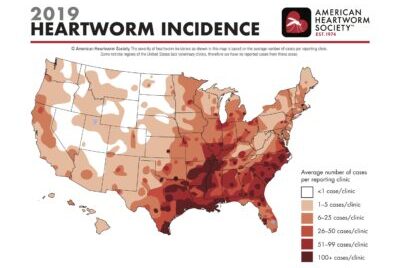Heartworm Disease in Cats: What You Need to Know

Heartworm Disease in Cats: What You Need to Know
June is Adopt a Cat Month, and I hope lots of cats will be getting fur-ever homes this month. In honor of our paw-some feline friends, I am going to devote all blogposts this month to feline topics.
I thought only dogs got heartworms?
Dogs are more susceptible to heartworm infection than cats, but cats can get heartworms. If bitten by an infected mosquito, the young adult heartworms cause respiratory signs in cats, including coughing, wheezing, vomiting and loss of appetite. This syndrome, known as HARD (Heartworm Associated Respiratory Disease) results from heartworm-induced inflammation in your cat’s lungs. Most heartworms in a cat die at this stage. Some mature and then die 2-4 years after the initial infection. When the mature heartworms die, the cat may have a flare-up of HARD. A dead heartworm can form a clot in the blood vessels of the lungs and cause life-threatening respiratory disease in your cat.
Why doesn’t my cat get a blood test every year?
The test veterinarians use to diagnose heartworms in dogs identifies adult female heartworms. Because heartworm-infected cats may only have a few heartworms or only male heartworms, the test doesn’t work very well in cats. It often takes a battery of tests: two different types of heartworm tests, chest x-rays and even an echocardiogram to confirm a diagnosis of feline heartworm disease.
Should my cat get preventative medication like my dog?
According to the Companion Animal Parasite Council, cats should receive heartworm preventative year-round, like dogs. But don’t just serve up your dog’s preventative to your cat; cats needs their own feline heartworm medication. Some might argue that since feline heartworm disease is so rare, preventative medications are not necessary. Those folks should think twice about that decision, since there is no effective treatment for feline heartworm disease. Others will argue their indoor cat is not exposed to mosquitos, but we have all been up in the middle of the night trying to silence the buzzing mosquito circling our head, calling this argument into question. Now that you have heard of feline heartworm disease, it’s time to talk with your cat’s veterinarian about the need for preventive medication.

































